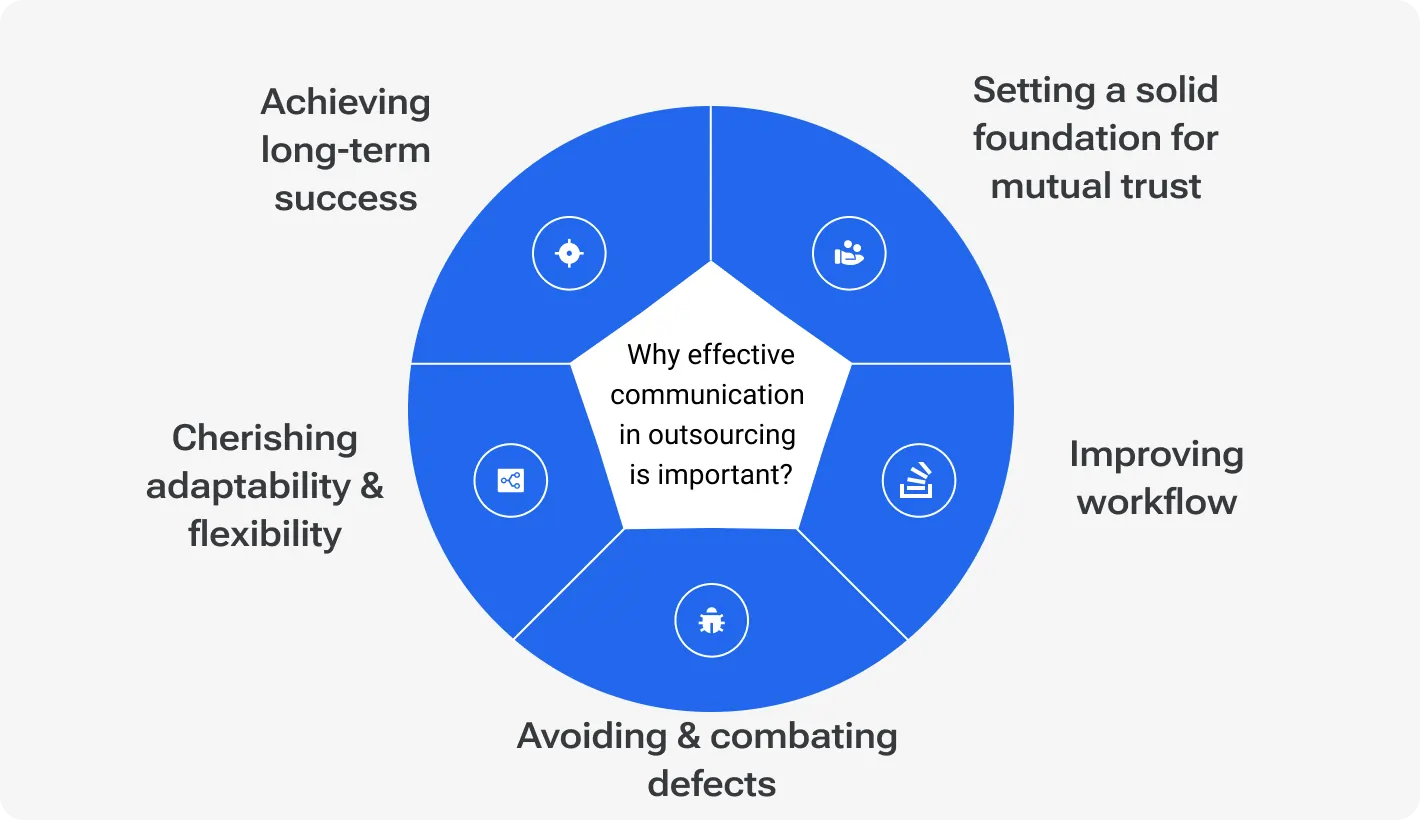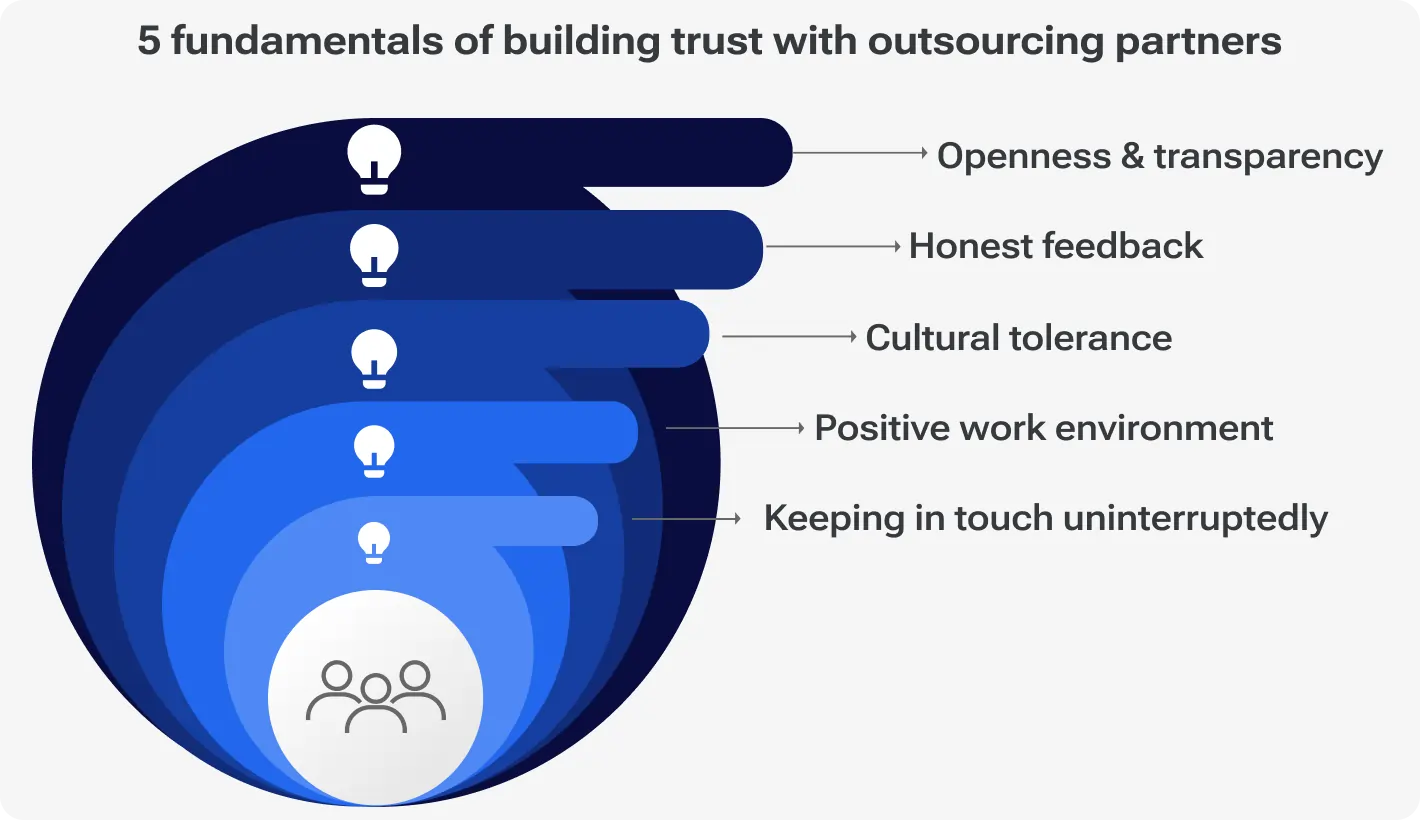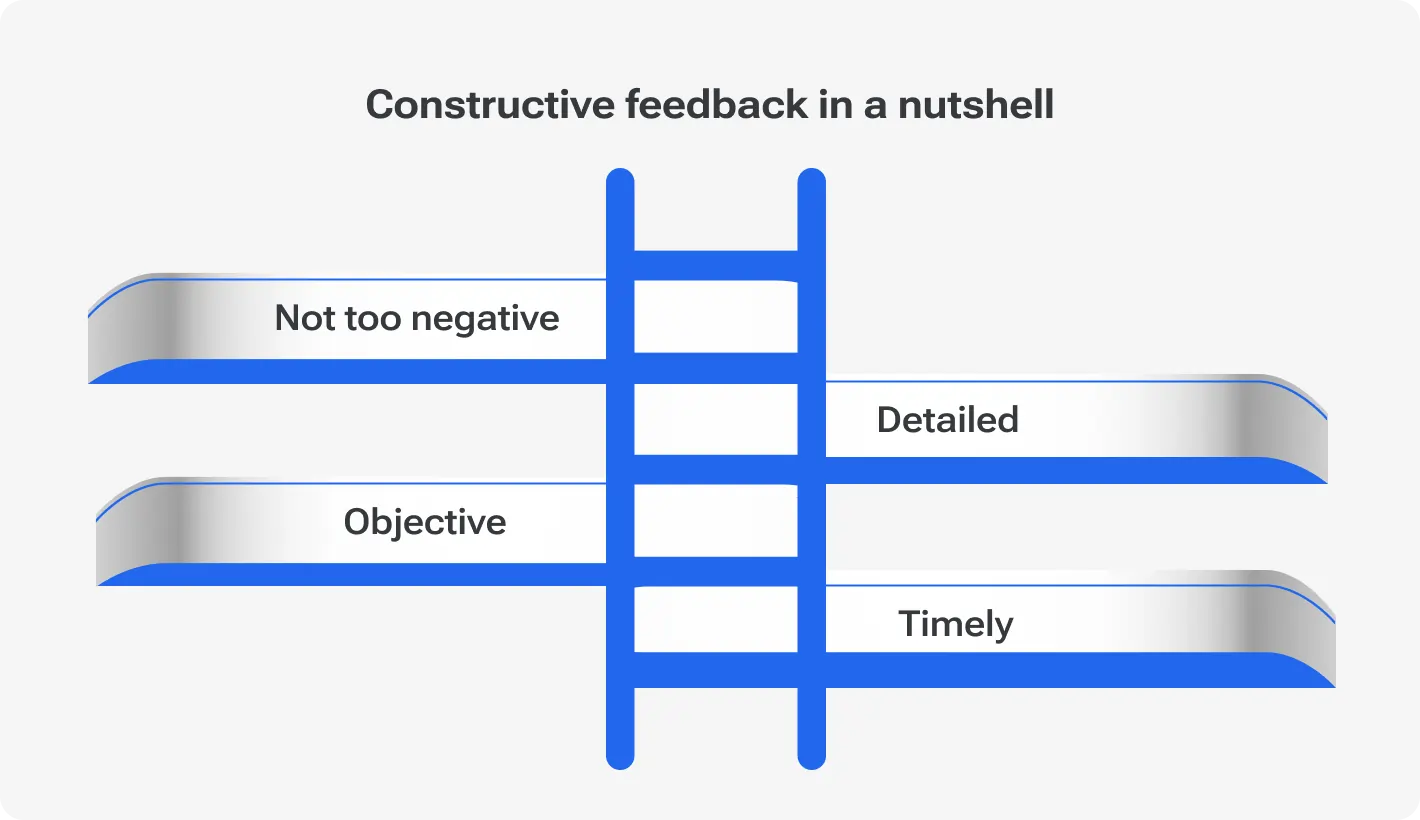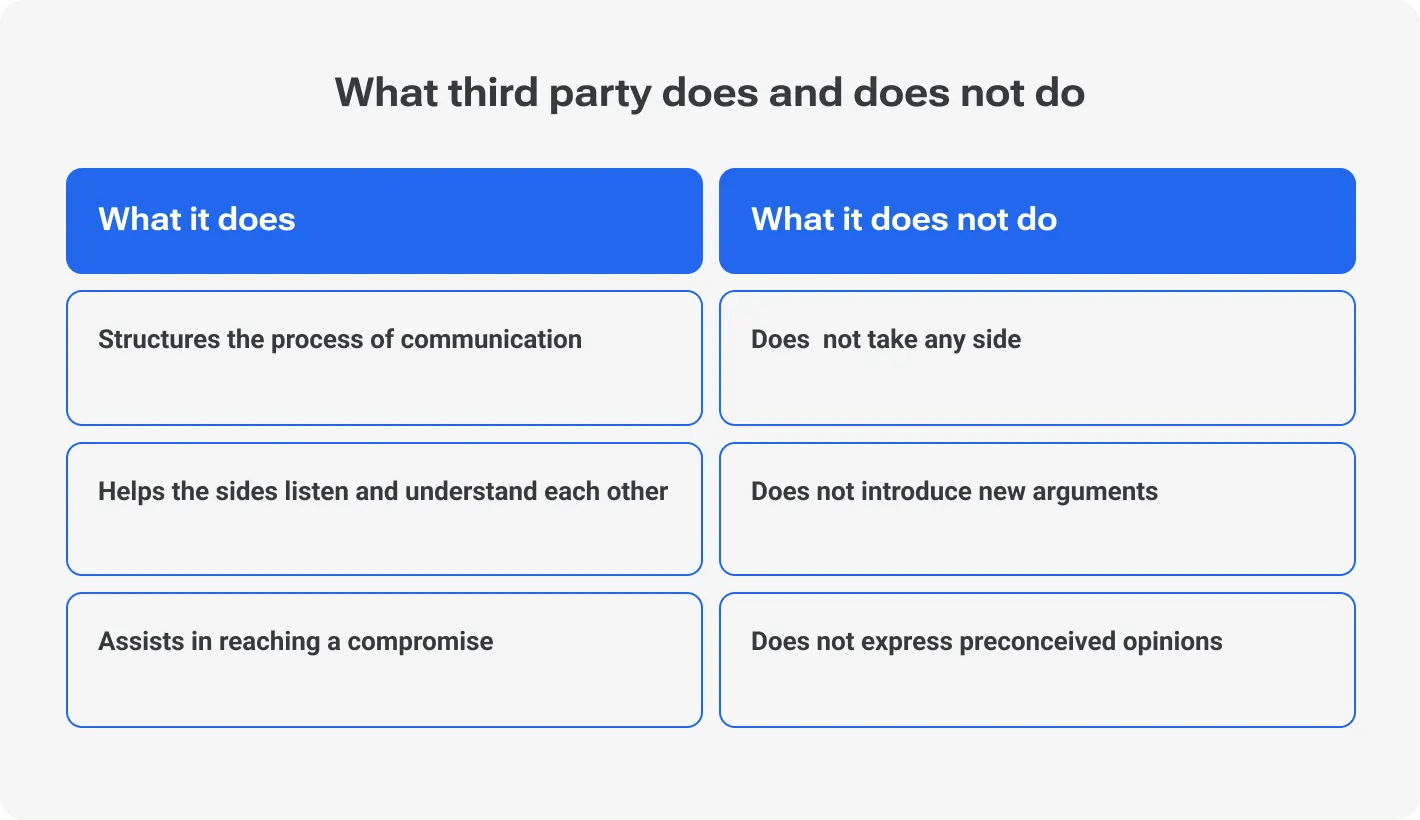Communication with the outsourcing partner directly affects the work results. Improperly built relationships can lead to inadequate product quality or missed deadlines. Without properly managing outsourcing relationships, the organization risks wasting both money and time.
Do you want to avoid such problems? It is not enough just to choose a good partner IT company. You also need to make an effort to build strong outsourcing relationships. Learn how to do this from this article!
End-to-end solutions with predictable budgets, a time-to-market advantage with budget savings of up to 50%
Why managing outsourcing relationships starts with effective communication
A properly built relationship with a partner IT company can help you achieve multiple positive effects in both the short and long term. Here are some outcomes of effective and correct communication.
Setting a solid foundation for mutual trust
Building trust is one of the best ways to collaborate with an outsourced partner, as it ensures you move together toward shared goals. And proper communication allows both parties to have confidence in each other.
An open and honest expression of thoughts on both sides makes both parties feel trustworthy and reliable. This will undoubtedly have a positive impact on the results of the work. The absence of lies and misunderstandings improves the productivity of work and the quality of the final result. Moreover, it has been proven that trust increases the productivity of work by as much as 260%.
Improving workflow
One of the best ways to collaborate with an outsourced partner is to establish a clearly organized interaction model, which ensures an efficient workflow. Clear communication is the cornerstone of effective collaboration with outsourcing partners, allowing both sides to align on goals and responsibilities. The more detailed they are, the better the result will be.
Moreover, close-knit communication can increase the productivity and effectiveness of work by 20-25%, as the McKinsey report states. And finally, by communicating regularly and transparently, you will be able to control the work of the outsourcing company at any stage.
Avoiding and combating defects
Some outsourcing companies that do not trust their customers may hide defects in their work with all their might. This may further lead to problems in product operation, frequent failures, and difficulties in code maintenance.
Transparent reports and honest feedback are critical when managing outsourcing relationships, as they prevent hidden issues and keep projects on track. With proper communication, you can:
avoid many mistakes through clear tasking;
identify defects at early stages;
address the identified flaws effectively.
Cherishing adaptability and flexibility
By constantly interacting with your team, you’ll achieve effective collaboration with outsourcing partners while staying flexible and adaptive to market shifts. This will allow you to remain flexible and better adapt to market conditions. You will be able to adjust your strategy as needed and make amends to the work done at different stages.
What to look for in the outsourcing partner?
Achieving long-term success
Proper communication and mutual trust improve each stage of work, and thus the final result. Properly organized interaction with a partner company answers the question of what are the keys to long-term partnership success in outsourcing? — trust, transparency, and consistent communication. By communicating effectively with external specialists, you can:
boost the work productivity;
reduce the number of errors;
get the deliverables that maximally coincide with the expectations;
All this demonstrates how to make outsourcing successful: through communication, adaptability, and shared ownership of results.
Why effective communication in outsourcing is important: Key benefits
Fundamentals of building trust with outsourcing partners
For many businesses, the issue of trust with an outsourcing partner becomes a stumbling block. How to develop the right relationship with an outsourced team? Here are the 5 main tenets of building trust.
Openness and transparency
Reporting untrue facts, reticence, or too late or biased feedback can kill trust between partners. To avoid this, it's important to communicate openly. Honesty and transparency are essential in managing outsourcing, as they build a strong foundation for collaboration and prevent costly misunderstandings.
All this will contribute to the trustworthiness of the relationship with the partner company. Also, this can help prevent unclarities and misunderstandings during task setting and completion.
Honest feedback
Providing objective feedback timely is essential for continuous improvement. To get the best possible final outcome, it is important to give quality comments on the intermediate results. So, make it a tradition to get regular progress reports and provide honest feedback on how satisfied you are with the work done at the current stage.
Cultural tolerance
Trust and cultural awareness are often overlooked in outsourcing relationships, yet they’re vital for avoiding friction and achieving long-term success. If your outsourcing partner is located in another country, or even on another continent, it is important to consider that the members of the external team have a completely different mentality.
If you do not respect their traditions and do not take into account the local culture of communication and ethics, it can undermine trust very much and negatively affect the process and results of work.
The culture within your company and your outsourcing partner's team can be drastically different. And that's okay! Treat the differences with understanding and avoid stereotypes and labeling. For example, if your company has a strict dress code, while your outsourcing partners connect on a video call in casual clothes, do not conclude that they are irresponsible or bad professionals. Or if it is customary in your company to have a small talk on general topics, while your outsourced partners immediately start discussing work issues, it does not mean that they do not trust you and avoid communicating with you.
If you don't understand or are uncomfortable with some of your external team's behaviors or habits, you can talk openly about it and ask if your partners would be comfortable doing things the way your culture dictates. However, beware of discussing sensitive topics, such as religion, politics, personal life, etc.
Positive work environment
A positive work atmosphere is one of the keys to how to make outsourcing successful, as it fosters collaboration and long-term loyalty. Here are some strategies for creating and maintaining it:
Don't be overly fixated on the downsides. Of course, it's important to discuss and correct the things you are not satisfied with. However, you should not dwell too much on the shortcomings.
Reward success. Balancing praise with constructive feedback is one of the best ways to collaborate with an outsourced partner, keeping motivation high and trust strong. Even if you have a lot of comments, start by praising what you like, thus keeping the overall tone of your response positive. In addition, implement a culture of rewarding good performance. You can do this through positive testimonials, as well as tips and additional bonuses.
Avoid direct accusations. Sometimes mistakes occur accidentally: for example, due to some misunderstandings or too tight deadlines. Therefore, it is better not to directly blame a particular team member for any shortcomings. This can kill trust and demotivate the team to keep trying hard. It is better to emphasize the essence of the mistake and the ways to correct it, rather than blaming specific people.
Respect work-life balance. Respecting schedules and time zones is a small but important step in creating strong partner relationships and showing your team you value their well-being. Also, try to estimate the timing of your tasks realistically, so that your external team doesn't have to work overtime or sacrifice quality for speed.
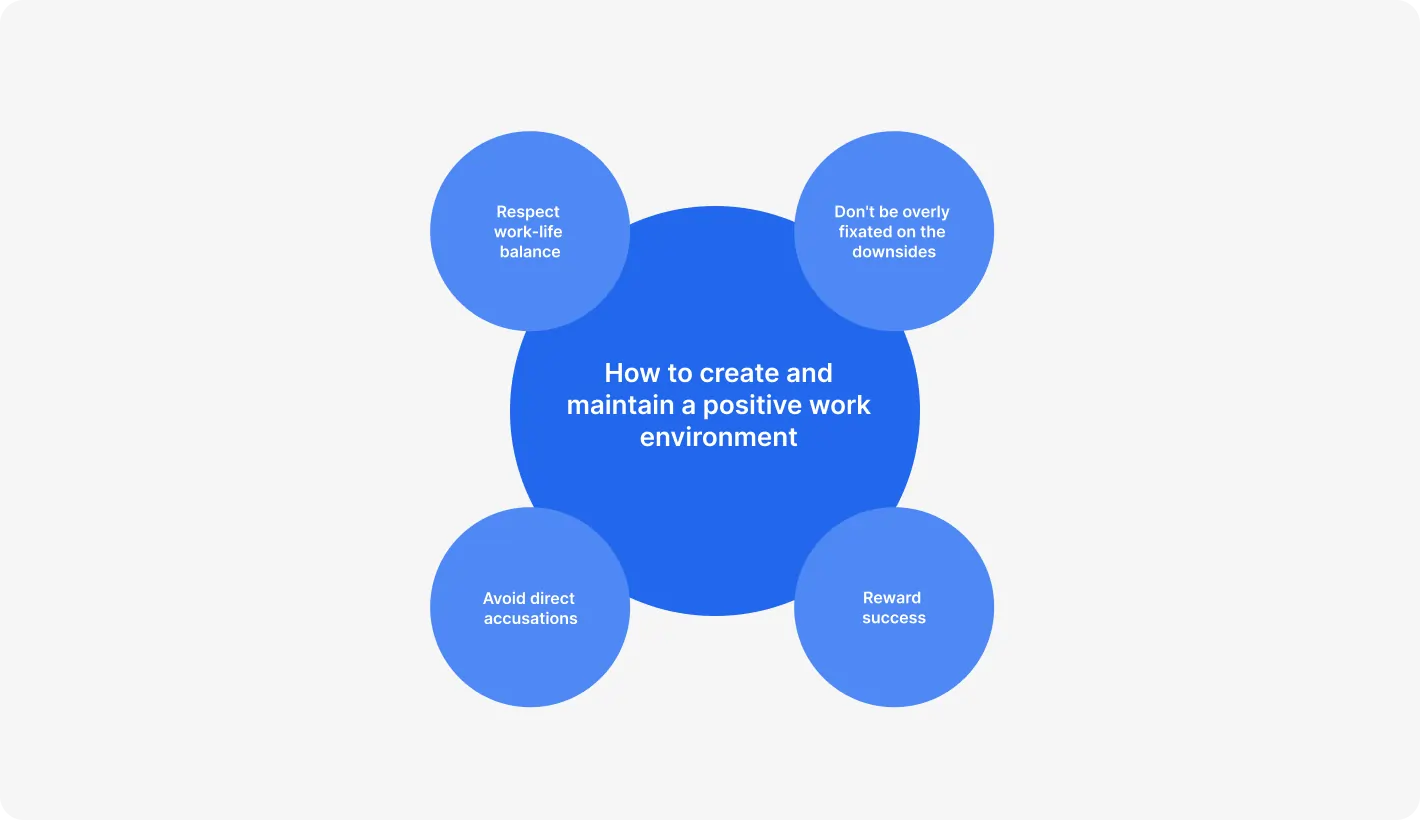
Keeping in touch uninterruptedly
To enjoy outsourcing success, it’s vital to maintain consistent communication and actively invest in building strong partner relationships. Thanks to this, you will be aware of the work done, and your outsourcing partners will understand how satisfied you are with the intermediate results and whether it is necessary to make any adjustments. Below, you will find a few strategies for staying in touch with outsourcing partners on an ongoing basis.
Establish and maintain a culture of regular reporting
Providing reports at an agreed time (for example, weekly) will allow you to be sure that the work is progressing as planned. Your feedback on these reports will allow your outsourcing partner to understand how much you like the intermediate results and whether it is necessary to correct the workflow.
Communicate through all convenient channels
You don't have to fixate on only one method of communication. You can use different channels depending on the situation. Check which communication methods are convenient for your outsourcing partner and feel free to use all of them, such as calls, video calls, emails, messengers, task managers, etc.
However, make sure you don't “lose” the important information among the different communication channels. It is best to communicate in all convenient ways while collecting and duplicating all the most essential data in one place, for example, in a task manager.
Hold regular meetings
Written communication via email and messengers may not be sufficient to fully and thoroughly discuss all work details. Therefore, to constantly maintain mutual understanding and track progress, hold regular meetings. This will give an opportunity to avoid miscommunication errors, as well as identify and correct any problems as soon as they arise.
So, make meetings not a rare occurrence, but an integral part of your collaboration. Agree on their frequency and time in advance at the very beginning of your cooperation. And don't worry if your external team is located far away from you. Modern easy-to-use video communication tools like Zoom or Google Meet will allow you to stay in touch and share all the information you need with each other remotely.
Have face-to-face interaction from time to time
General meetings with the whole team may not be enough to discuss some specific work issues. To avoid taking up the time of the whole team when you need the opinion of one specific specialist, hold one-to-one meetings with that person. This will allow you to discuss the issue in as much detail as possible.
Of course, it is most effective to have face-to-face meetings in person. However, if your partner company is located in another country, and you don't have time to travel there, it can be just as productive to communicate via video calls.
How to manage an outsourced development team effectively
Effective communication best practices
How to organize proper and effective communication with the external IT team? Here is a detailed checklist you can use to do that.
Effective communication checklist
Clearly define the goals
State the tasks in detail
Properly assign responsibilities
Document the project scope and tasks
Practice active listening
Listen and take into account the partners’ opinions
Make sure your partners understand your point of view
Keep in touch constantly and effectively
Communicate via different channels (combine emails, messengers, calls, video calls, depending on the situation)
Use convenient communication tools (e.g. Slack, Zoom, Google Meet, etc.)
Hold regular meetings at a pre-scheduled time (e.g. weekly)
Have occasional face-to-face interactions
Set and cherish a positive work atmosphere
Keep the balance between positive and negative feedback
Avoid blaming certain specialists for the errors
Implement a system of rewards for excellent performance
Maintain work-life balance
Ensure openness and transparency
Do not mislead your partner with untrue facts
Do not gloss over important information
Provide only objective unbiased feedback
Learn the basics of the culture and work ethic in the country where your external IT team is based
Avoid labeling because of cultural differences
Feel free to speak up if you are uncomfortable with certain peculiarities of communication
Treat the other culture with understanding and respect
Avoid discussing sensitive topics such as politics, religion, or personal life
Request progress reports regularly
Provide timely and honest feedback for future improvement
Dealing with problems and resolving conflicts
Even if you do your best to build proper communication, there is still a risk of some misunderstandings and conflicts. You should be prepared for this and know how to resolve them if they arise. Below, we will discuss the basics of conflict resolution in outsourcing.
Moreover, you should know how to properly troubleshoot problems and errors so that it doesn't lead to a breakdown in trust. This will help you maintain comfortable and positive communication, which will positively affect all future cooperation. How to do it? We will also discuss this further in the article.
Identify the issues timely: the earlier the better
The earlier you identify the problems, the less time and money it will take to fix them. That's why regular detailed reports are so important. Request and analyze them all the time to see if you are moving in the right direction.
Provide constructive feedback
If you identify some shortcomings or inconsistencies with your requirements and expectations, make sure you communicate this correctly to your external team.
When compiling your feedback, it is very important to make sure that it is:
Timely. Don't delay providing feedback on the work done. The sooner you submit your comments, the sooner the implementers will make edits and will be able to move on with the project.
Objective. Use only certain facts instead of emotions when providing feedback.
Detailed. Vague wording won't help solve the problem. State exactly what you would like to improve, why, and how.
Not too negative. Don't focus only on errors when providing feedback. If the team receives only negative comments every time, they will become less and less motivated over time. To avoid this, even if you see a lot of flaws, start with positives and praise, and only then move on to criticism.
Encourage honest and open dialogue
When errors are identified, dwell only on your own opinion on how to correct them. Be also open to listening to the opinions of external specialists you cooperate with. They may be able to suggest even more effective solutions.
Keep an eye on the work environment
Constantly monitor the quality of communication and the health of the team. If you start to notice any changes in engagement or the character of communication, try to identify the causes immediately to prevent discord.
Work as one team
Although your team may be spread across continents, the keys to long-term partnership success in outsourcing lie in working as one cohesive team with shared goals. Involve your external specialists in discussing your projects, making decisions on how to implement certain ideas in the best way, and so on.
To do this, provide your partners with all the necessary information about your company, processes, business goals, etc. Also, hold regular meetings to discuss all sorts of working points.
Understanding your business and communicating frequently and regularly will allow outsourcing professionals to feel like they are on the same wavelength as you and are working in tandem to achieve the shared goals. This will reduce the risk of problems, mistakes, or conflicts, and make it easier to resolve them, even if they do occur.
Practice third-party mediation in the case of major conflicts
This technique can resolve even the most significant conflicts. It involves the intervention of a third neutral party (mediator) in the conflict to help resolve it.
The role of a mediator in the conflict
How does the practice of third-party mediation take place?
Conflict resolution in outsourcing with the help of this technique proceeds in several stages:
1. Pre-mediator
At this stage, the third party meets with each side of the conflict separately. During these meetings, the mediator listens to both parties to understand the conflict and prepares the disputants for the subsequent steps.
2. Joint session
In this stage, both sides of the conflict meet in the presence of a third party. The mediator manages the communication process so that both parties feel calm and confident. The neutral party may ask guiding and clarifying questions and make unbiased comments.
This helps the parties to express their opinions more clearly and understand the other side's point of view better. In addition, it makes the arguments on both sides more detailed for better mutual understanding.
Moreover, the mediator can help the parties to make their speech less emotional. This allows them to be more objective for faster and better compromise.
3. Negotiation
At this stage, the neutral party helps formulate potential solutions for each party and communicate their opinions to the opposing party. The mediator can help formulate the options as clearly as possible while taking into account and respecting the opinion of the opponent in the dispute. The third party also helps to find common ground in the opinions of both parties, which contributes to a more successful conflict resolution.
Furthermore, the mediator motivates each participant in the conflict to be flexible and willing to compromise. It also helps to keep a balance between the needs and points of view of each disputant.
4. Agreement
This is the final stage that marks the successful resolution of the conflict. When the parties have reached a compromise, the overall decision can be documented to avoid subsequent misunderstandings.
Perceive mistakes not as problems but as growth areas
It's important to not only address mistakes but to learn from them. This can be applied both to the work flaws and to communication problems you have encountered. Instead of endlessly blaming someone for the issues and thereby spoiling your relationship with your partners, take a lesson from the situation and move on to new heights. After the conflict has been resolved, analyze:
what factors contributed to it;
what precursors may have helped to identify it at an even earlier stage;
how you can avoid similar conflicts in the future.
This will help you improve and build an even more comfortable and trusting relationship in the future for fruitful work.
Best practices for managing outsourcing relationships (with a real case study)
Creating trusting and effective communication is not just about daily syncs — it’s about managing outsourcing relationships so they evolve into true partnerships. Therefore, in this section of the article, you will find the best strategies for managing outsourcing partnerships, as well as a case study that will help you make sure that becoming one close-knit team with outsourcing specialists is real.
The top 3 best practices for maintaining good relationships with a partner
Have you already established a trusting and comfortable relationship with your outsourced professionals? If so, you certainly don't want to spoil them. To make them lasting, use some techniques listed below.
Set shared goals
Your brand mission and your long-term business goals should be fully understood by your partners. Don't skimp on the details about your company so that outsourcers get into and imbibe the philosophy of your organization. This will make them feel like they are on the same page as you.
Additionally, involve your partners in the process of setting objectives and determining how to achieve them. The goals set together will become common for you and your partners. And you will go towards them together as one united team.
Hold regular check-ins
Check-ins are regular short meetings that give an opportunity to briefly discuss the work process and track progress. They are usually conducted bi-weekly or weekly, and sometimes even daily. They enable all the participants of the work process to act coherently, as well as to identify problems and stumbling blocks at the earliest possible stage.
Celebrate success together
Many companies that have both internal and external development teams celebrate their successes with in-house employees only, forgetting about their loyal outsourced assistants. This, of course, is not conducive to relationships with partners who may feel unappreciated. Celebrating achievements together is a simple yet powerful way to build strong partner relationships that last for years.
Devico and Tipalti: The story of trust and cohesion
The story of the collaboration between Devico and Tipalti is a true example of the successful relationship between an organization and an outsourcing partner. The fintech company, founded in 2010, decided from the get-go to expand its capabilities with the help of outsourced talent.
At that time, the organization had only one IT specialist supported by 1 outsourced QA engineer from Devico. Over the many years of working together, they became a unified team that went together towards a common goal: to develop a product of the finest quality.
The company's in-house developer was responsible for writing the code, while the QA engineer from Devico took the full initiative for strict quality control, bug detection, and fixing. The coordinated work allowed Tipalti to improve its product, releasing 25 updates per year.
Over time, the organization has significantly evolved and both its internal and outsourced teams have grown. However, the thing that has remained unchanged even after 16 years is the cohesiveness of the cooperation between Tipalti and Devico. QA engineers from the outsourced company continue to help improve the product and lead the company to success.
The close-knit and effective work of in-house and external IT specialists allowed the business to grow from a little fintech startup to a world-known company with more than $40 billion of transaction volume yearly.
Final thoughts
Creating and maintaining the right relationship with an outsourcing partner is essential for productive work. Focusing on clarity, trust, and cultural understanding shows how to make outsourcing successful while avoiding errors and delays. Contact us and let’s work together to reach success without problems, and additional costs.
Support your business growth with a global talent pool of experienced software engineers


